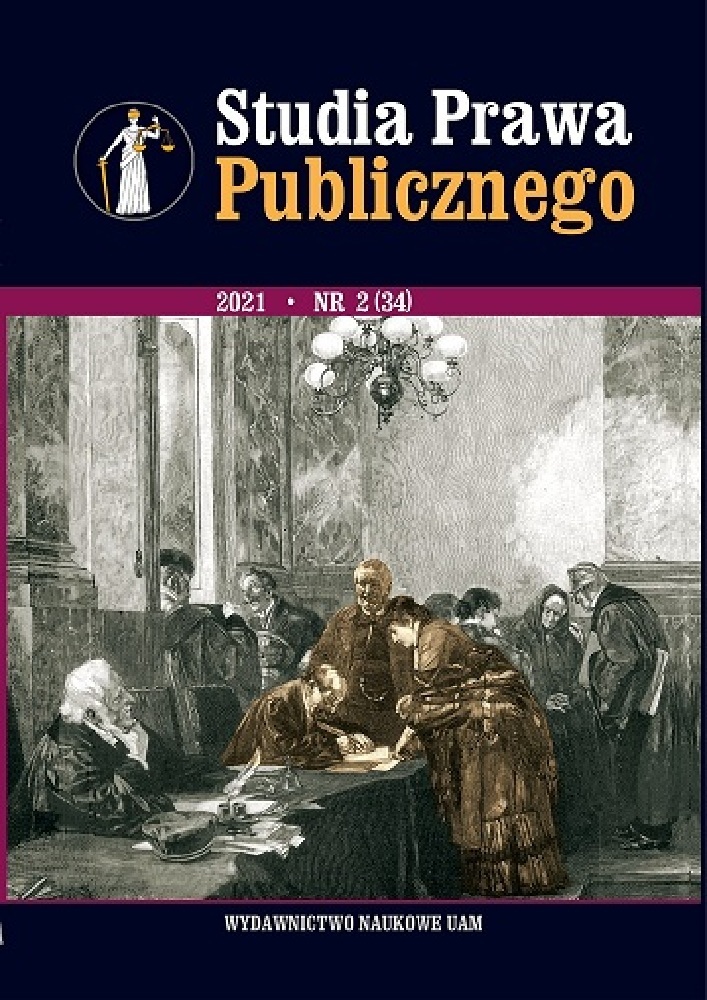Abstrakt
The premise of this text is to analyze by means of selected examples the issues related to the broad definition of security, and modern and developing terrorist migration. Moreover, the aim of this paper is to approach the subject in question from the perspective of the current legal state by means of the formal and dogmatic method, but also by means of the method of criticism and analysis of the literature, which will allow a full understanding of the shape, functioning and causes of errors of modern security bodies. The above will influence the formulation of de lege ferenda postulates in the conclusion. The European Union is based on solid foundations. So how does globalisation, in its broadest sense, affect the world around us and the elementary values of the modern world? Modern terrorism, which strikes at the security of developed countries, is undoubtedly a global phenomenon that also sows fear for normal existence in one’s own country. Unrestricted, cross-border terrorist activity is leading to intra-community division. This is the result of internal conflicts over common values. The surveillance and detection of migrants from outside the European community who are criminals is becoming a more difficult task with time. This is due to the fact that terrorist organisations operate according to a well-defined plan, creating extensive networks and recruiting new members for their groups in many countries simultaneously. The fight against terrorism is being waged on Europe’s streets and in the homes and schools of its citizens. The struggle for security begins at the borders of European countries. What is crucial in this fight is the latest equipment and cooperation between security bodies, including the special services of all the countries of the European Union and NATO. It is essential to introduce appropriate legislation to limit the free movement of people who commit crimes and to develop methods to distinguish terrorists from economic migrants or refugees. The state must guarantee the security of its citizens and combat terrorism effectively.
Bibliografia
EUROPOL, Changes in Modus Operandi of Islamic State Revisited, http://www.EUROPOL.europa.eu/publications-documents/changesin,modus-operandi-of-islamic-state-revisited (dostęp: 21 VIII 2020).
Faiola A., The mystery surrounding the Paris bomber with a fake Syrian passport, „The Washington Post”, http://washingtonpost.com/world/europe/the-mystery-surrounding-the-paris-bomber-with-a-fake-syrian-passport/2015/11/17/88adf-3f4-8d53-11e5-934c-a369c80822c2_story.html?noredirect=on (dostęp: 21 VIII 2020).
Freud S., Das Unbehagen in der Kultur, w: idem, Kulturtheoretische Schriften, Frankfurt a. Main 1974.
Hautzinger Z., A terrorizmus elleni kuzdelem idegenjogi eszkozei, Modernkori veszelyek rendeszeti aspektusai, Pecs: Pecsi Hataror Tudomanyos Kozlemenyek XVI, Budapest 2015.
Jost P.M., Sandhu H.S., The Hawala Alternative Remittance System and its Role in Money Laundering, http://www.treasury.gov/resource-center/terrorist-illicit-finance/Documents/FinCEN-Hawala-rpt.pdf (dostęp: 21 VIII 2020).
Kis-Bendek J., Dzihadizmus, Radikalizmus, Terrorizmus, Budapest 2016.
Majer P., W poszukiwaniu uniwersalnej definicji bezpieczeństwa wewnętrznego, „Przegląd Bezpieczeństwa Wewnętrznego” 2012, nr 7(4).
Molnar A., Travel Documents in Use by Terrorists, „Internal Security” 2019, no. 11(1).
Piekarski M., Ewolucja taktyki terrorystów po roku 2001, „Przegląd Bezpieczeństwa Wewnętrznego” 2015, nr 13(7).
Pomianowski P., Maćkowiak E., Zwalczanie finansowania terroryzmu w świetle prawa obowiązującego w Polsce i we Francji, „Przegląd Bezpieczeństwa Wewnętrznego” 2012, nr 6(4).
Rudner M., Misure of Passports: Identity Fraud, the Propensity of Travel, and International Terrorism, „Studies in Conflict & Terrorism” 2008, no. 31(2).
Sulowski S., W poszukiwaniu definicji bezpieczeństwa wewnętrznego, „Przegląd Bezpieczeństwa Wewnętrznego” 2009, nr 1.
Szekely Z., Application of Robotics for Enhanced Security: European Research on Security Robots, Budapest 2014.
Vajda A., Kuzdelem a terrorizmus ellen, Budapest 2003.
Wojciechowski S., Terroryzm. Analiza pojęcia, „Przegląd Bezpieczeństwa Wewnętrznego” 2009, nr 1.
Licencja
Prawa autorskie (c) 2021 Patryk Roger Zabrocki

Utwór dostępny jest na licencji Creative Commons Uznanie autorstwa – Użycie niekomercyjne – Bez utworów zależnych 4.0 Międzynarodowe.
